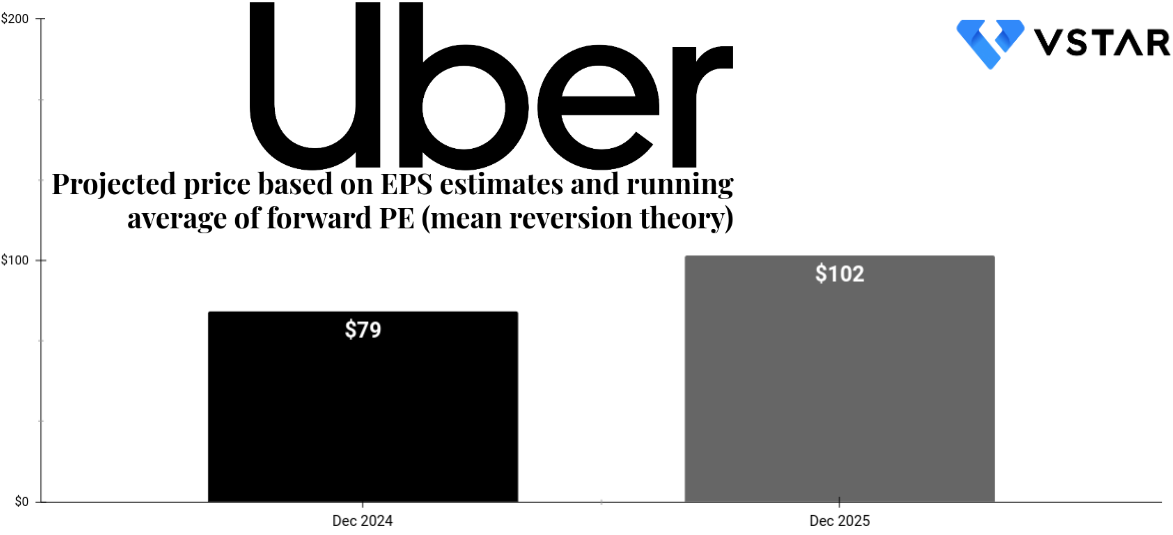Will Uber's Self-Driving Cars Drive Stock Prices Higher?

Table of Contents
The Market Potential of Autonomous Vehicles for Uber
The potential market for autonomous ride-sharing services is colossal. Analysts project explosive growth in the autonomous vehicle market over the next decade, reaching hundreds of billions of dollars. This presents a significant opportunity for Uber, which already holds a dominant position in the ride-sharing market. This existing infrastructure and brand recognition give Uber a considerable competitive advantage as the autonomous vehicle market matures. Uber's move into this space positions them to potentially dominate the future of transportation.
- Reduced operational costs through automation: Self-driving cars eliminate the need for human drivers, significantly reducing labor costs, a major expense for ride-sharing companies.
- Increased efficiency and scalability: Autonomous vehicles can operate 24/7, increasing efficiency and allowing for greater scalability to meet fluctuating demand.
- Potential for new revenue streams (e.g., autonomous delivery): Self-driving technology can expand beyond ride-sharing to encompass autonomous delivery services for goods and packages, creating new revenue streams.
- Expansion into underserved markets: Autonomous vehicles could make transportation more accessible in underserved areas with limited public transport or driver availability.
Technological Challenges and Development Costs
Developing fully autonomous vehicles presents significant technological hurdles. Creating reliable software capable of navigating complex real-world scenarios requires advanced artificial intelligence (AI) and machine learning (ML) algorithms. This is a computationally intensive process, requiring significant computing power and vast datasets for training. Furthermore, integrating sophisticated hardware, ensuring its reliability, and addressing potential cybersecurity vulnerabilities are crucial challenges. The high research and development costs associated with this technology are substantial, and potential delays and unforeseen challenges could impact timelines and profitability.
- Software development complexities (AI, machine learning): Creating robust and reliable AI algorithms for safe and efficient autonomous driving is incredibly complex.
- Hardware integration and reliability: Integrating sensors, cameras, and other hardware components seamlessly and ensuring their reliable operation in diverse conditions is a significant engineering challenge.
- Safety testing and regulatory approvals: Rigorous safety testing and obtaining regulatory approvals are lengthy and expensive processes, delaying the deployment of autonomous vehicles.
- Cybersecurity vulnerabilities: Autonomous vehicles are vulnerable to hacking and cyberattacks, posing serious safety and security risks.
Regulatory Landscape and Legal Implications
The regulatory environment surrounding autonomous vehicles is rapidly evolving but remains fragmented across different jurisdictions. This variability poses challenges for companies like Uber, requiring them to navigate diverse legal frameworks and adapt their technology to comply with varying regulations. Moreover, the legal liability associated with accidents involving self-driving cars is a significant concern, requiring clear legal frameworks to define responsibility and liability in case of accidents.
- Legal frameworks for liability in autonomous vehicle accidents: Determining liability in the event of an accident involving an autonomous vehicle remains a complex legal issue.
- Insurance requirements for autonomous vehicles: Establishing appropriate insurance coverage for autonomous vehicles is crucial to mitigate potential financial risks.
- Data privacy concerns related to autonomous vehicle operations: The vast amount of data collected by autonomous vehicles raises significant data privacy concerns.
- Public perception and acceptance of self-driving technology: Public trust and acceptance of self-driving technology are essential for widespread adoption.
Investor Sentiment and Stock Market Reaction
Investor sentiment toward Uber and its autonomous vehicle program is crucial in determining the impact on its stock price. Positive news, such as successful autonomous vehicle tests or regulatory approvals, tends to boost investor confidence and drive up the stock price. Conversely, setbacks, accidents, or regulatory delays can negatively impact investor sentiment and lead to a decline in stock value. Competition from other companies developing autonomous vehicle technology, such as Waymo and Cruise, also plays a significant role.
- Impact of successful autonomous vehicle tests on stock price: Positive results from autonomous vehicle tests can significantly boost investor confidence and the stock price.
- Effect of regulatory setbacks or accidents on investor confidence: Negative news, such as accidents or regulatory setbacks, can significantly impact investor confidence and the stock price.
- Comparison to competitor performance in the autonomous vehicle space (e.g., Waymo, Cruise): Uber's performance relative to competitors in the autonomous vehicle market significantly influences investor sentiment.
- Analysis of analyst ratings and predictions for Uber's stock price: Analyst ratings and predictions regarding Uber's stock price can influence investor behavior and market trends.
Conclusion
Uber's investment in self-driving cars presents both significant opportunities and considerable challenges. While the potential market for autonomous ride-sharing is enormous, technological hurdles, regulatory uncertainty, and competition pose substantial risks. The ultimate impact on Uber's stock price will depend on the company's ability to overcome these obstacles and successfully deploy its self-driving technology.
Call to Action: Stay informed about the latest developments in Uber's autonomous vehicle program to make informed investment decisions. Understanding the interplay between technological progress, regulatory changes, and investor sentiment is crucial when considering the question: Will Uber's self-driving cars drive stock prices higher? Continue researching the autonomous vehicle market and Uber's stock performance for a comprehensive perspective.

Featured Posts
-
 Scholar Rock Stocks Unexpected Dip Mondays Market Reaction
May 08, 2025
Scholar Rock Stocks Unexpected Dip Mondays Market Reaction
May 08, 2025 -
 Urgent Dwp Message Check Your Bank Account For 12 Benefit Payments
May 08, 2025
Urgent Dwp Message Check Your Bank Account For 12 Benefit Payments
May 08, 2025 -
 Psl 10 Ticket Sales Begin Today
May 08, 2025
Psl 10 Ticket Sales Begin Today
May 08, 2025 -
 Zasto Se Dzordan I Jokic Ljube Tri Puta Bobi Marjanovic Krivac
May 08, 2025
Zasto Se Dzordan I Jokic Ljube Tri Puta Bobi Marjanovic Krivac
May 08, 2025 -
 Analysis Trump Media Crypto Com Etf Partnership And The Rise Of Cro
May 08, 2025
Analysis Trump Media Crypto Com Etf Partnership And The Rise Of Cro
May 08, 2025
